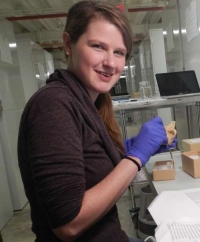2022 Reeder-Myers, L.A., T.J. Braje, C.A. Hofman, E.A. Elliott Smith, C. Garland, M. Grone, C.S. Hadden, M. Hatch, T. Hunt, A. Kelley, M.J. LeFebvre, M. Lockman, I. McKechnie, I.J. McNiven, B. Newsom, T. Pluckhahn, G. Sanchez, M. Schwadron, K. Smith, T. Smith, A. Spiess, G. Tayac, V.D. Thompson, T. Vollman, E.M. Weitzel, and T.C. Rick. Forgotten fisheries, Indigenous communities, and the shifting baseline of global oyster harvest. Nature Communications. doi: 10.1038/s41467-022-29818-z
2022 Rick, T., T. Braje, K. Easterday, L. Graham, C.A. Hofman, B. Holguin, A. Mychajliw, L. Reeder-Myers, and M. Reynolds. Cultural Keystone Places and the Chumash Landscapes of Kumqaq', Point Conception, California. American Antiquity. doi: 10.1017/aaq.2021.154
2021 Eller, A.R., S.L. Canington, S. Saiyed, R.M. Austin, C.A. Hofman, S. Sholts. What does it mean to be wild? Assessing human influence on the environments of nonhuman primate specimens in museum collections. Ecology and Evolution. doi: 10.1002/ece3.8006
2021 Zuckerman, M., R.M. Austin, C.A. Hofman. Historical Anatomical Collections of Human Remains: Exploring Their Reinterpretation as Representations of Racial Violence. Annals of the American Academy of Political and Social Science Invited commentary. doi: 10.1177/00027162211008815.
2021 Fellows Yates, J.A., I.M. Velsko, F. Aron, C. Posth, C.A. Hofman, R.M. Austin, C.E. Parker, A.E. Mann, K. Nägele, K.W. Arthur, J. W. Arthur, C.C. Bauer, I. Crevecoeur, C. Cupillard, M.C. Curtis, L. Dalén, M. Díaz-Zorita Bonilla, J.C Díez Fernández-Lomana, D.G. Drucker, E. Escribano Escrivá, M. Francken, V.E. Gibbon, M.R. Gonzalez Morales, A. Grande Mateu, K. Harvati, A.G. Henry, L. Humphrey, M. Menéndez, D. Mihailović, M. Peresani, S. Rodríguez Moroder, M. Roksandic, H. Rougier, S. Sázelová, J.T. Stock, L.G. Straus, J. Svoboda, B. Teßmann, M.J. Walker, R.C. Power, C.M. Lewis, K. Sankaranarayanan, K. Guschanski, R. Wrangham, F.E. Dewhirst, D.C. Salazar-Garcia, J. Krause, A. Herbig, C. Warinner. The evolution and changing ecology of the anthropoid primate oral microbiome. PNAS. doi: 10.1073/pnas.2021655118.


